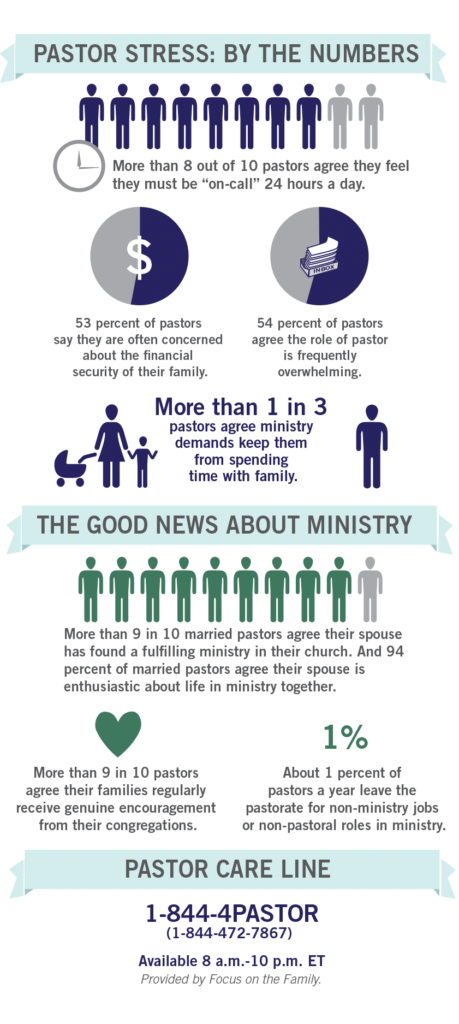
By Lisa Cannon Green
The statistics are sobering: Four out of five senior pastors expect conflict in their church. Many (54 percent) say being a pastor is overwhelming. Nearly half (48 percent) say the demands of ministry seem too much to handle.
Yet churches can do much to ease pastors’ stress and encourage them to stay in ministry, according to a new report from Lifeway Research examining the reasons pastors quit.
LifeWay’s survey of 1,500 pastors from evangelical (including non-denominational) and historically black churches found most are hanging on. About 1 percent a year leave for non-ministry jobs or non-pastoral roles in ministry. But the study identified many stress points that can contribute to a pastor’s departure. Top reasons for leaving the pastorate, current pastors say, are a change in calling, conflict in the church, and family issues.
Here are six recommendations on how churches can better support their pastors and possibly help avoid these issues.
Set reasonable expectations. More than 1 in 5 pastors believe they face unrealistic demands. That can lead to burnout, the experts say.
“After personal failures—deep, frustrating, agonizing defeats—many will decide, ‘I can’t do this anymore,’” says Jamie Johns, a corporate chaplain in Houston, Texas.
A church can help by having members pitch in with duties such as hospital visits and not expecting the pastor or his family to do everything, says Melissa Haas, director of support groups for Hope Quest Ministries.
Donald Hicks, president of Church Health Solutions, recommends a written contract—“a pastor covenant that basically says what I’m going to do for the church, what the church is going to do for me, and what we’re going to do together.”
Provide paid time off. More than 80 percent of pastors feel they must be on call 24 hours a day. As a result, they may neglect their own spiritual health, the report says.
“Personal retreats, solitude, times away where you can think and reflect and pray—to me, that’s crucial,” says Lance Witt, president of Replenish Ministries.
Without prodding from the church, pastors may not take a personal Sabbath. “Firmly insist they recharge, recreate, and reconnect,” says Jared Pingleton, director of counseling services for Focus on the Family. “One of the burnout factors is that you give and you give and you give until you give out.”
Make sure pastors can get counseling. For confidentiality, this may need to occur outside the church and in a different town, the report notes.
There has to be a cultural shift away from this notion that a pastor can’t struggle,” says James Eubanks, director of counseling for First Baptist Church in Woodstock, Georgia. He recommends telling pastors, “Hey, we know you have clay feet just like everyone else, so we want you to get any help you need, any time you need it.”
Have a clergy support group. More than a third of pastors say the demands of ministry keep them from spending time with their family. To help, churches should have a group “whose main objective is to keep their pastor and his family healthy, well-fed, well-housed, and to make sure their automobiles are safe to drive,” says H.B. London, president of H.B. London Ministries.
Pay the pastor adequately. More than half of pastors say they are often concerned about the financial security of their family. “When a pastor is not paid properly, most of his time is spent trying to figure out how he’s going to support his family,” London says. For help determining church staff salaries visit CompStudy.LifeWay.com.
Encourage friendships. To find fulfillment, pastors need to get out of the office and make true friends, the report says.
“Pastors need some life-giving friendships where they’re not the pastor and they’re not on, but actual friendships that replenish their life and fill them up,” says Witt.









